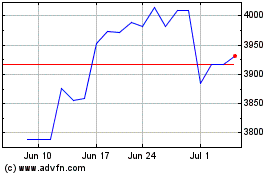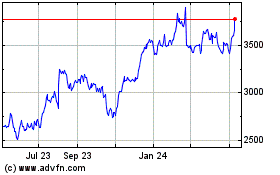Chinese Ride-Hailing App Didi Seeks $2 Billion -- WSJ
July 18 2019 - 3:02AM
Dow Jones News
By Julie Steinberg
This article is being republished as part of our daily
reproduction of WSJ.com articles that also appeared in the U.S.
print edition of The Wall Street Journal (July 18, 2019).
China's dominant ride-hailing company Didi Chuxing Technology
Co. is working to raise up to $2 billion from investors, according
to people familiar with the matter, the latest sign that firms in
the sector including Uber Technologies Inc. and Lyft Inc. are eager
to raise money to fuel investments while posting steep losses.
The Beijing company plans to sell additional shares at the same
price when it raised money in July 2018 from Booking Holdings Inc.,
the online travel company formerly known as Priceline, the people
said. The company's valuation at that time couldn't be learned.
After the cash is injected from this round, the seven-year-old
company is likely to have a paper valuation of around $62 billion,
one of the people said. That is up from a valuation of $56 billion
from a 2017 funding round.
Despite being the biggest player in China's ride-hailing market,
Didi is still struggling to reach profitability as it faces smaller
rivals; it expands into other forms of transportation businesses
such as auto services, including leasing and vehicle maintenance;
and it hires hundreds of employees to improve customer service.
Earlier this year a Didi executive said that for every ride in
China it facilitated in the three months ended December, the
company lost on average 2% of the fare paid. That means it cost the
company $1.02 for every dollar generated from fares.
Didi's shareholders include some of the world's most valuable
tech firms and investors -- SoftBank Group Corp., Apple Inc.,
Alibaba Group Holding Ltd. and Tencent Holdings Ltd. It isn't clear
how current investors will respond to Didi's search for fresh
funds. SoftBank and Tencent representatives declined to comment.
Apple and Alibaba spokesmen didn't immediately comment.
Last year, Didi considered issuing a convertible bond, as well
as launching an IPO. But it pulled back on both efforts after two
female passengers were murdered, and the company focused on
revamping its safety measures. An IPO isn't expected until at least
next year, according to people familiar with the company.
Both Lyft and Uber flopped in trading after their initial public
offerings earlier this year, testing investors' appetites for
companies with big losses in an otherwise strong IPO market. Both
companies continue to trade below their respective IPO prices, but
have recovered from their lowest trading levels in May.
Uber reported an accumulated deficit of about $7.9 billion as of
Dec. 31, while Lyft's was more than $2.9 billion, according to
securities filings, and both have warned operating costs will rise
as part of investments in their respective platforms.
Revenue growth for ride-hailing companies is expected to rise
nearly 20% this year to $183.7 billion, with the U.S. being the
world's largest market, according to analytics firm Statista. While
ride-sharing continues to gain in popularity world-wide, growth is
expected to slow in the years ahead.
At the new $62 billion valuation, Didi would rank in the top
three private tech companies globally, after Ant Financial Services
Group and Bytedance Ltd. The increase in valuation size is modest,
reflecting the subdued atmosphere for tech companies, especially in
China.
Uber, which owns 15.4% of Didi, implied in securities filings
earlier this year that the Chinese firm was valued at $51.6 billion
as of December. Uber in 2016 sold its operations in China to Didi
in exchange for a minority stake in the company.
Didi is soliciting funds amid what people in the tech industry
are calling a "capital winter," meaning it is difficult for Chinese
companies to raise money. That has been especially true for those
focused on consumers. After years of sky-high valuations and
lackluster market performance for some IPOs, many Chinese tech
companies have slowed their frenzied capital-raising and have
focused on executing their business plans instead.
Didi had $7.7 billion in net cash after debt at the end of 2018,
said a person familiar with the situation. The firm had $12 billion
in cash reserves when it raised money in 2017, the Journal earlier
reported.
The company has been spending on developing new technologies
such as autonomous driving. Didi also has reached deals with car
makers like Germany's Volkswagen AG and China's Guangzhou
Automobile Group Co. to explore self-driving and other technologies
or design vehicles for car-sharing.
--Yoko Kubota contributed to this article.
Write to Julie Steinberg at julie.steinberg@wsj.com
(END) Dow Jones Newswires
July 18, 2019 02:47 ET (06:47 GMT)
Copyright (c) 2019 Dow Jones & Company, Inc.
Booking (NASDAQ:BKNG)
Historical Stock Chart
From Aug 2024 to Sep 2024

Booking (NASDAQ:BKNG)
Historical Stock Chart
From Sep 2023 to Sep 2024
